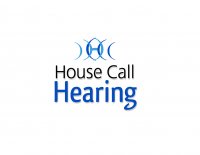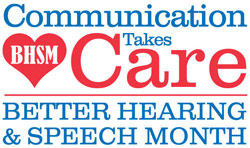- Posts: 9
- Thank you received: 2
May is Better Hearing and Speech Month
- HouseCallHearing
-
 Topic Author
Topic Author
- Tourist
-

"The National Institute on Deafness and Other Communication Disorders (NIDCD) celebrates Better Hearing and Speech Month, an annual observance sponsored by the American Speech-Language-Hearing Association (ASHA) since 1927. During May, ASHA, the NIDCD, and other organizations raise awareness about communication disorders, which take many forms and span all ages.
Communication disorders are treatable. However, the longer they are overlooked or ignored, the harder they can be to manage. Early detection and treatment of speech, language, and hearing disorders contributes to better quality of life, shorter treatment periods, and reduced costs for individuals and society."
Do You Need A Hearing Test - if you (or a loved one) answer(s) yes to 3 or more of these questions, please consider getting your (or your loved one's) hearing ability evaluated.
What is age-related hearing loss?
Age-related hearing loss (presbycusis) is the loss of hearing that gradually occurs in most of us as we grow older. It is one of the most common conditions affecting older and elderly adults.
Approximately one in three people in the United States between the ages of 65 and 74 has hearing loss, and nearly half of those older than 75 have difficulty hearing. Having trouble hearing can make it hard to understand and follow a doctor’s advice, respond to warnings, and hear phones, doorbells, and smoke alarms. Hearing loss can also make it hard to enjoy talking with family and friends, leading to feelings of isolation.
Age-related hearing loss most often occurs in both ears, affecting them equally. Because the loss is gradual, if you have age-related hearing loss you may not realize that you’ve lost some of your ability to hear.
There are many causes of age-related hearing loss. Most commonly, it arises from changes in the inner ear as we age, but it can also result from changes in the middle ear, or from complex changes along the nerve pathways from the ear to the brain. Certain medical conditions and medications may also play a role.
Please Log in or Create an account to join the conversation.
- HouseCallHearing
-
 Topic Author
Topic Author
- Tourist
-

- Posts: 9
- Thank you received: 2
What should I do if I have trouble hearing?
Hearing problems can be serious. The most important thing you can do if you think you have a hearing problem is to seek professional advice. There are several ways to do this. You can start with your primary care physician, an otolaryngologist, an audiologist, or a hearing aid specialist. Each has a different type of training and expertise. Each can be an important part of your hearing health care.
What treatments and devices can help?
Your treatment will depend on your hearing loss, so some treatments will work better for you than others. There are a number of devices and aids that can improve hearing loss. Here are the most common ones:
- Hearing aids are electronic instruments you wear in or behind your ear. They make sounds louder. Things sound different when you wear a hearing aid, but an audiologist or hearing aid specialist can help you get used to it. To find the hearing aid that works best for you, you may have to try more than one. Ask your audiologist or hearing specialist whether you can have a trial period with a few different hearing aids. Both of you can work together until you are comfortable. (Read the NIDCD fact sheet Hearing Aids for more information.)
- Cochlear (COKE-lee-ur) implants are small electronic devices surgically implanted in the inner ear that help provide a sense of sound to people who are profoundly deaf or hard-of-hearing. If your hearing loss is severe, your doctor may recommend a cochlear implant in one ear or both. (Read the NIDCD fact sheet Cochlear Implants for more information.)
- Assistive listening devices include telephone and cell phone amplifying devices, smart phone or tablet "apps," and closed circuit systems (induction coil loops) in places of worship, theaters, and auditoriums. (Read the NIDCD fact sheet Assistive Devices for People with Hearing, Voice, Speech, or Language Disorders for more information.)
- Lip reading or speech reading is another option that helps people with hearing problems follow conversational speech. People who use this method pay close attention to others when they talk, by watching how the speaker's mouth and body move.
What questions should I ask before buying a hearing aid?
We'd be happy to answer any and all questions and help you re-gain your hearing!Before you buy a hearing aid, ask your audiologist these important questions:
- What features would be most useful to me?
- What is the total cost of the hearing aid? Do the benefits of newer technologies outweigh the higher costs?
- Is there a trial period to test the hearing aids? (Most manufacturers allow a 30- to 60-day trial period during which aids can be returned for a refund.) What fees are nonrefundable if the aids are returned after the trial period?
- How long is the warranty? Can it be extended? Does the warranty cover future maintenance and repairs?
- Can the audiologist make adjustments and provide servicing and minor repairs? Will loaner aids be provided when repairs are needed?
- What instruction does the audiologist provide?
Please Log in or Create an account to join the conversation.







